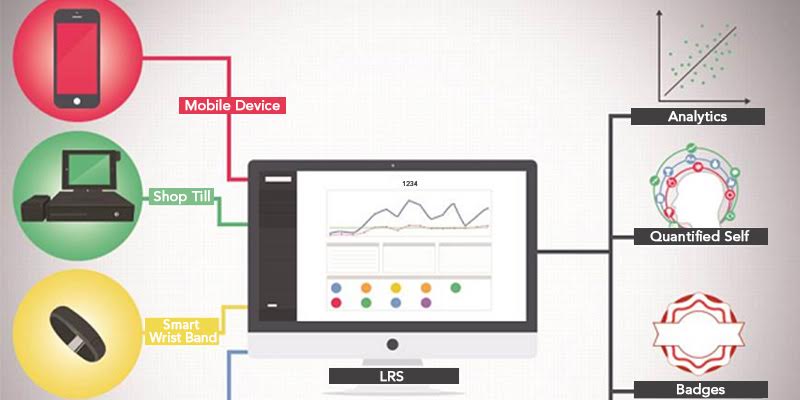
One of the most interesting new developments in learning technology is now appearing in the LMS marketplace. Leading companies like Saba, SkillSoft, and Workday are supporting xAPI, the new standard in learning management integrations.
Tin Can, Experience API (application program interface), and xAPI all refer to the same open standard for transferring information on learning activities.
First, let us explain that xAPI is not a new version of SCORM. Sharable Content Object Reference Model (SCORM) is a data transfer standard for handling applications that create and deliver learning content. Experience API is a standard for capturing learning activities and sending them to a database called a Learning Records Store (LRS). The LRS can be in your LMS or it can be a stand-alone database.
An xAPI statement sends a structured record (noun, verb, object) which, in a learning context means “I did this.” Now, instead of tracking only classroom and e-learning activities in your LMS, you can capture and store any activity. It gives us a way to manage and report on the new ways of learning: mobile, social learning, experiences, job aids, reading, or anything else you can imagine.
At its most basic, xAPI will take over some of the manual tracking and data entry tasks the we use now. But the possibilities go far beyond just tracking learning. We’ve been thinking about the possibilities and would like to suggest ideas you might find interesting.
One of the most important learning activities is experience. We have worked with many organizations that use job experiences and special projects to develop high potential employees. By connecting the processes of assigning the experience, capturing feedback, and submitting a completion statement to the LRS, you can transfer a record of the experience to the employee profile.
In jobs like customer service, information about what an agent knows and needs to learn can be connected to job aids and other performance support tools. Analytical tools can monitor the agent’s conversation with a customer. The CMS can deliver the information the agent needs to handle an unfamiliar situation, then monitor performance to reinforce the learning.
Knowledge workers often deal with new, complex problems. The worker may need to assess the problem, gather resources, tap into a mini-lesson, use collaborative tools, work through the solution, and either execute the solution or prepare it for others to execute. By embedding xAPI into the processes, you can assess the learning and the associated performance.
LMS and other systems using xAPI can talk to each other. That gives us the possibility that people could install an app on their mobile devices that would capture their learning activities. They could then access their records from any point in their educational and work history.
Many companies have been sitting on the sidelines, waiting for the new technology to prove its worth. Now that major LMS and learning content providers are adopting xAPI, we expect to see more companies jump in very soon.
What are your thoughts about this new technology? Share your thoughts using the comment form below. We welcome your ideas.
Image Source: Association for Talent Development
Phenom eCloud is a comprehensive technology solutions provider committed to empowering businesses to overcome challenges, enhance their workforce capabilities, and achieve superior outcome





Leave a Comment